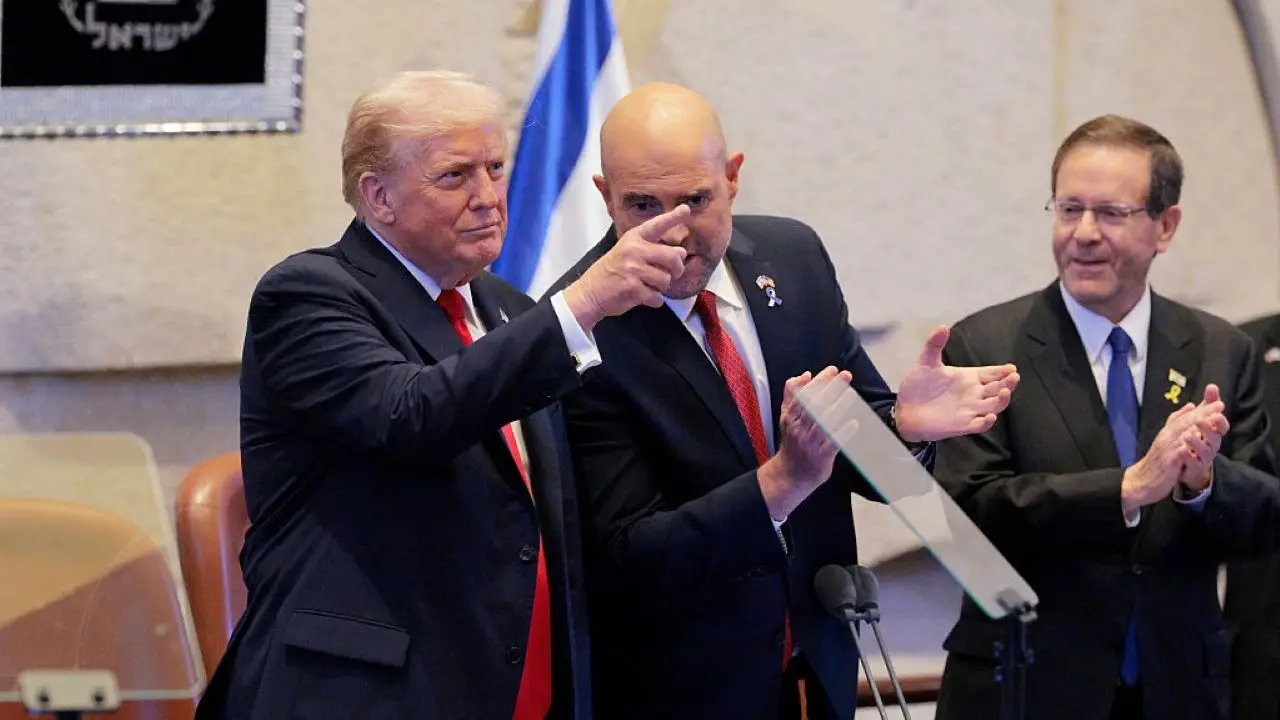In a moment charged with symbolism and emotion, U.S. President Donald Trump delivered a historic speech before the Israeli Knesset, declaring the return of all surviving hostages from Gaza as the dawn of a “new era of peace.” The address marked the culmination of an intense diplomatic effort that brought the release of the final 20 Israeli hostages and an official ceasefire after more than two years of conflict.
A Triumphant Moment for Israel
Trump’s arrival in Jerusalem was greeted with loud applause and standing ovations. Accompanied by Prime Minister Benjamin Netanyahu and President Isaac Herzog, he entered the Knesset chamber to thunderous cheers from lawmakers and guests.
“This is the end of an age of terror and death,” Trump declared. “It is the beginning of an age of faith, hope, and peace.”
The speech followed the emotional reunions of the last hostages with their families. Across Israel, television broadcasts showed tearful embraces and moments of relief, as citizens celebrated the long-awaited returns. Trump paid tribute to those who had perished, promising that “their memories will be honored, their remains will be brought home, and their families will never be forgotten.”
From Conflict to Peace
While praising Israel’s resilience and military strength, Trump urged the nation to seize the opportunity to pursue lasting peace.
“Israel has achieved all that can be achieved through strength,” he said. “Now is the time to turn these victories into lasting security and prosperity for future generations.”
He called for reconciliation within Israel’s leadership and made an unexpected appeal for national unity, including a symbolic pardon for Prime Minister Netanyahu. “History will remember not the bitterness of trials, but the courage of those who sought peace,” Trump added.
Trump emphasized that the ceasefire must serve as the foundation for a new regional order—one built not on fear, but on cooperation and shared progress. He expressed optimism that the peace could expand to include other regional actors, including Arab and Muslim nations that have yet to normalize ties with Israel.
Protests and Divisions in the Knesset
Not all members of the Israeli parliament welcomed Trump’s message uncritically. During his address, two opposition lawmakers interrupted, demanding recognition of Palestinian statehood and holding signs calling for equal rights. Security quickly removed them from the chamber as Trump paused briefly before continuing his remarks.
The disruption underscored the deep divisions that persist in Israeli society. For some, the speech symbolized a long-overdue victory and closure. For others, it raised uneasy questions about the cost of peace and the future of Palestinians in Gaza and the West Bank.
A Fragile Ceasefire and Uncertain Future
The ceasefire agreement that enabled the hostages’ release includes Israel’s commitment to release approximately 2,000 Palestinian prisoners, including several long-term detainees. It also calls for the gradual demilitarization of Gaza, monitored by international forces, and a framework for rebuilding its devastated infrastructure.
Despite the jubilant mood, experts warn that the ceasefire remains fragile. The governance of Gaza, the role of Hamas, and the pace of reconstruction are still unresolved issues. Many families remain displaced, and humanitarian challenges persist. The next phase will require sustained coordination among Israel, Egypt, the United States, and the Palestinian Authority.
Trump acknowledged these challenges but insisted that the moment marked “the true beginning of peace.” He described the silence of rockets and the calm in Israel’s skies as “a sign that history has changed.”
Looking Ahead: Regional Summit in Egypt
Following his Knesset address, Trump is expected to travel to Cairo for a regional peace summit hosted by Egypt’s President Abdel Fattah el-Sisi. Leaders from across the Middle East are expected to attend, aiming to secure long-term stability and economic recovery for Gaza and neighboring regions.
For now, Trump’s speech has injected new energy into a conflict-weary region. Whether this energy translates into lasting peace depends on the willingness of all sides to compromise and cooperate.
As the sun set over Jerusalem, the sense of relief was palpable. After years of fear and bloodshed, Israel and its people tasted a moment of peace — fragile, uncertain, but profoundly significant.
















Leave a Reply